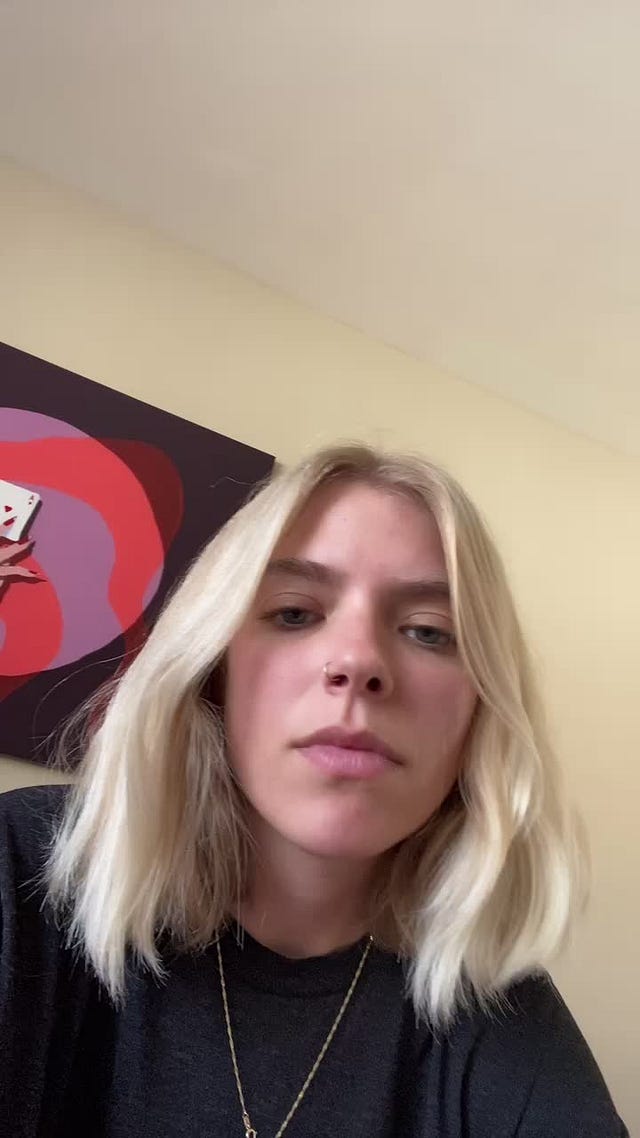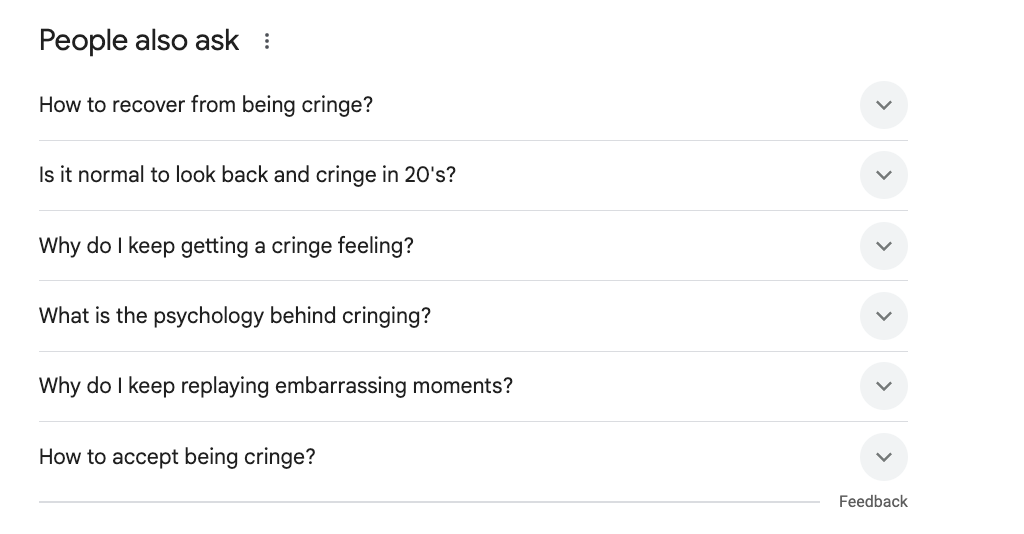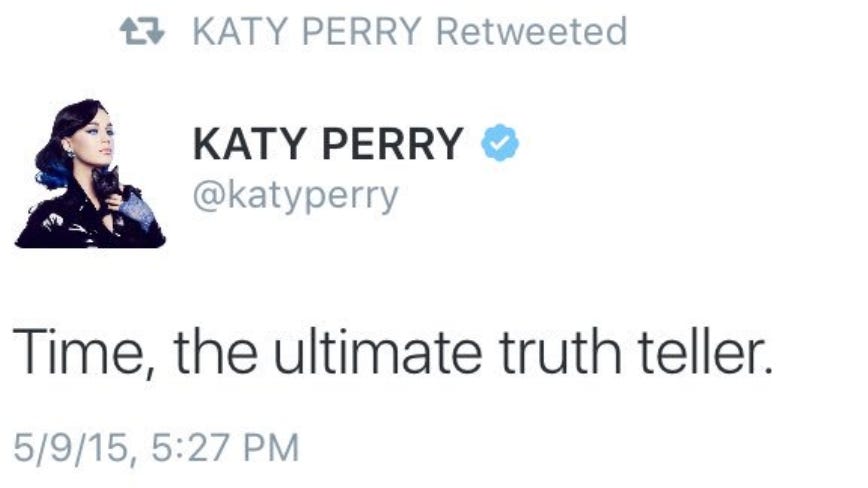Katy Perry and the Case for Getting Older
How aging performs, especially for women, especially online, especially in pop culture
Trigger Warning: I’m Talking About Being 30 Again
If you’re a long-time reader, sorry here I go again. If you’re new to Midwesthetic and me, welcome to my love of being 30, which will almost certainly turn into a love of being in my 30’s and I’m hoping I can spin that all the way to 40, 50, etc etc.
I bring up my love of all things 30+ because I know that aging is weird. It’s been weird, especially in a beauty obsessed world, certainly in the time of TikTok’s Internet, always in pop-culture, and most-of-all weird for women always.
I’m reporting the news.
Pop-culture has tried to make aging less weird the last several years. Allure’s 2017 Anti Anti-Aging cover seemed like a real, mainstream signal amongst noise. “Age-Positive” micro-movements, age-nostic beauty collections, and podcasts like Late-Bloomers have all attempted to chip away at the big, weird conversation. But the discomfort remains, and right now it’s not just about our smile lines or botoxable foreheads. The aging conversation today still includes all that, sure- but aging is becoming more tightly tied to just being… embarrassing.
Enter: Katy Perry
Now, before I get into this let me say that being embarrassing (ie cringe) is not a crime however, Katy Perry’s inner-circle, trips to space, and real-estate litigation definitely feel like crimes. But we’re focusing on persona, branding, pop-culture, and the music today.
Katy Perry is, for all intents and purposes, the Patron Diva of Cringe. To understand cringe fully, we have to take a step back to where I believe the true dawn of cringe began: cheugy.
Remember cheugy? The term has allegedly existed since 2013, but it didn’t take us by the neck until 2021. When Hallie Cain posted this TikTok 👇🏻
The definition is as follows:
Cheugy - The opposite of trendy. Stylish in middle school and high school but no longer in style. Used when someone still follows these out of date trends. This may include but not be limited to fashion, habits on social media, usage of slang, etc.
Now, the difference between cheugy of yesteryear and cringe today is that cringe is having somewhat of a resurgence.
I know what you’re thinking, are we about to make a case for Katy Perry? The answer is still no.
Despite the last several years and thousands of TikToks bemoaning Millennial Cringe there seems to be a pivot, what was once cringe is now welcomed with open arms. In fact the NY Times just reported on it. Everything from big hair to recession pop is on the upswing. (Even the “older sister side part” is on the rise. What a nice reframe. Think of all the Millennial tears shed.)
But back to Perry,
in a culture that’s bending toward “letting people enjoy things” and cancelling cringe as we know it, one would think that Perry’s immutable brand of 2010’s kitsch would thrive. But it just hasn’t and I have some thoughts as to why.
She’s (not) a Pop-Mommy
I was thinking about the way fans call their favorites “Mother” Gaga gets it, even Taylor Swift holds the moniker. Katy Perry, a literal mother, doesn’t seem to hold this title very often and I think the reason why is that pop-star motherhood describes a level of self-reference, recognition-of-trailblazing, and iconography that transcends decade to decade. When Lady Gaga revisits sounds that harken to The Fame era of her discography it feels like an active choice, when Taylor Swift conceptualizes the “eras” of her career it’s a meaningful retrospective. There’s a level of intentionality that comes through as they’ve aged and progressed their careers.
Katy Perry’s career for the last decade has seemed all but intentional. I felt bad writing that, genuinely- especially as someone who deeply and sincerely loves One of the Boys and Teenage Dream. Both are powerful records made with wit and snark, they had the beginnings of points of view. It’s interesting to me that the erosion of Katy’s popularity started sinking faster when she boldly declared she was moving into “purposeful pop” which felt hollow and more of a performative statement designed to grab headlines than pay off. Which leads my to my second point,
Katy Perry doesn’t see herself as a contradictory figure
The 2010’s were a different time, Obama-era activism was more talk than action. A pop star stating her pop was purposeful was mostly enough. Things are different today, whether it’s with their dollars, evolving lyrics, or public commentary, public figures are expected to make public statements.
Katy makes statements, lofty-ambiguous ones about love or connection. Her friends seem to say everything about her politics for her and her contradictions. Oddly, it doesn’t seem like she sees herself as contradictory. She’s publicly Blue-ish but Bezos-pilled, with no acknowledgement that could help us dimensionalize who Katy Perry the person is vs the public image. It feels a bit frozen in time and place, that place being 2015.
Aging comes with contradictions, acknowledgement of them and acceptance where possible— well, at least to me.
The performance vs the personhood
It’s easy to bandwagon on someone for being embarrassing when we see them as less of a person and more of a branded-entity. I don’t know who Katy Perry is when she takes off her whipped cream bra and heads home for the night. Her lyrics and music don’t tell me, her tour doesn’t show me, and her public voice is so quiet I never hear her, only about her. The person disappears behind the performance, instead we see a marketing asset- something we can dissect, meme, and lately, dismiss.
Her camp and kitsch don’t have to be shelved in 2010. If anything, true camp by nature is fluid, it can be exaggerated, reinvented, even aged. The problem is knowing that the performance hasn’t evolved when the person behind it inevitably has.
In cringe culture we mock those who seem desperate to hold onto something that’s already passed, I think because it shows that there’s a disconnect. When the performance doesn’t reflect where the person actually is whether it be emotionally or artistically, it just feels hollow. Nothing resonates because nothing is being exposed or brought to the surface. And in music especially, that’s crucial.
I think about the woman who wrote “Thinking of You” a lot
(that’s Katy Perry btw) where and who she was in that moment. In pop culture, especially for women, the line between expression and parody can blur. Katy’s recent album release felt like the latter. Still hollow, grasping at relevance by way of musically trend-jumping.
Culture forgives cringe when it’s rooted in identity. OOTB, Teenage Dream, they gave us a peek into 20-something Katy Perry, and if we never hear from her again that’s fine with me. Musically, I’d love to hear from 40 year old Katy. The bummer reality is Katy has/had the potential to be a pop-great and her history still declares her one, but her contemporaries continue to surpass her simply by being themselves. The truth is, you’re not betraying your age group by evolving, you’re betraying yourself if you don’t.
So no, maybe the answer isn’t just ditch the whipped cream bra. But instead asking the question, what does Katy want it to say at 40 that it didn’t say at 25?










real katy perry heads remember when she was with travis mccoy and in the gym class heroes music video. what a time.
Okay love this so much. 1) I'm obsessed with getting older/being in my 30s, and I'm so happy you are too! I remember a 19-year-old coworker giving me shit a few years back for being old (I was maybe 27 at the time) and stopping her dead in her tracks when I shrugged and said I loved being old. I don't think it truly ever crossed her mind before that you could enjoy it which me sad that's what often gets projected to younger generations
2) I am SAT for this KP analysis and taking notes ✍️ She has definitely always come off to me as one of the least self-aware pop stars, and I think you nailed it with tying it back to her personhood/lack of identity